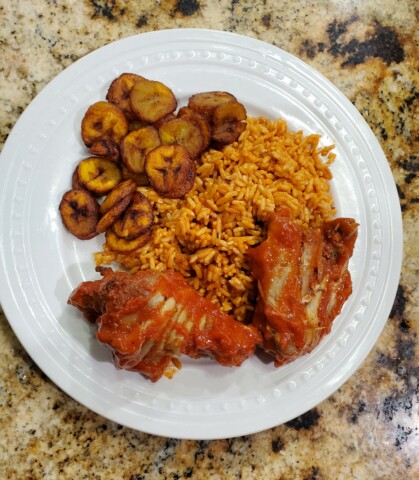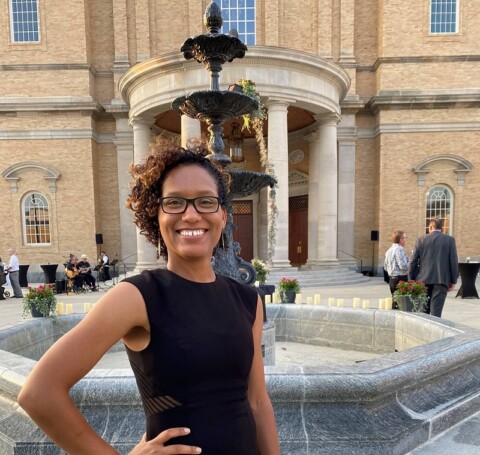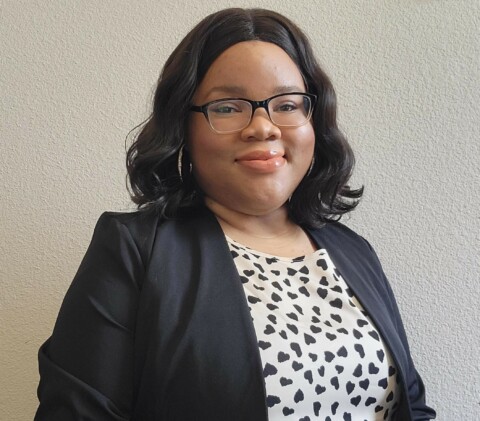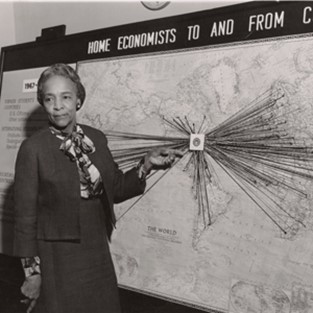2023 February is Black History Month
February is Black History Month, established in 1926 by Black historian Carter G. Woodson to celebrate the achievements of African Americans and recognize their central role in U.S. history.
Learn more about Black registered dietitian nutritionists’ contributions to the nutrition and dietetics profession.
IAND Board Member and Black History Month Spotlight

Nigerian Jollof Rice
Jollof Rice is a rich and incredibly tasty west African one-pot Meal. This meal is one of the most common West African dishes. However, each of these countries has its variation of this meal.
Course: Lunch/Dinner
Cuisine: African
Prep Time10 minutes
Cook Time50 minutes
Total Time1 hour
Servings12 People
Calories418kcal
Ingredients
- 3/4 cup oil
- 1 medium onion sliced
- 5 Tbsp Tomato paste
- 4 cloves Garlic
- 1 Tbsp Ginger Grated
- 2 bay leaves
- Blended pepper sauce see below
- 1 Tbsp Thyme
- 1 Tbsp Curry Powder
- 1 Tsp Salt or add to taste
- White Pepper or black pepper to taste
- 1 Tbsp chicken bouillon powder or 3 cubes
- 6 Cups Rice Long grain
- 4 Cups chicken stock
- 1 large tomato sliced
- 1 medium onion sliced
- 2 tbsp butter at room temperature optional
For the sauce, blend together:
- 3 Red Bell Pepper
- 3 Tomatoes Plum
- 2 Scotch bonnet
- 1 Onion Diced
Instructions
- Heat the cooking oil in a large pan. When the oil is hot, add the diced onions and cook for about 3 to 5 minutes, or until the onions are soft.
- Next, add the tomato paste and fry for about 5 minutes. Then add the garlic, ginger, and bay leaves and let it cook in the tomato paste for about 2 minutes.
- Add the blended pepper and allow the pepper to cook until the water is reduced entirely and the oil is seen floating on the fried pepper—about 15 minutes.
2023 Lunar New Year Celebrations in Various Countries
The IAND Inclusion, Diversity, Equity, and Accessibility Team has provided a personal profile to support this year’s theme.
Lunar New Year is traditionally celebrated in East Asian countries, especially in China and others influenced by Chinese culture like Vietnam, South Korea, Singapore, Malaysia, and Indonesia. Lunar New Year may be called different names in different East Asian countries and communities, but it is celebrated on the same date (and surrounding days) with similar celebrations.
Lunar New Year marks the beginning of a new year on China’s traditional lunisolar calendar. It is a time for festive family gatherings.
It is the most important festival in China (where it is known as Chinese New Year or Spring Festival), and it is also widely celebrated in South Korea (where it is known as Seollal), in Vietnam (as Tet), as well as Singapore, Indonesia, Malaysia, and other countries with a significant overseas Chinese population.
Lunar New Year falls on different dates each year, but always falls between January 21 and February 20 of the international standard calendar. Its traditional Chinese celebrations last for 16 days, from Lunar New Year’s Eve to the Lantern Festival.
In 2023, Lunar New Year will fall on Sunday, January 22nd and start a year of the Rabbit.
Yuhan Huang, MS, RDN, LD, is a private practice registered dietitian at Indiana Nutrition Group with extensive experience in nutrition. She combines evidence-based research, nutrition education, and behavior change counseling to help others dig into the root causes and expand their food choices so they can find a long-term, non-diet approach to healthy eating.
Yuhan earned her Bachelor of Science degree from the University of Toronto and her Master of Science degree in nutrition from the University of Michigan. She also completed her low-FODMAP training for IBS through Monash University’s program.
Why you wanted to be an RD:
I’ve always been interested in working in the health care field, and it is my passion to help people live healthier and happier lives. After I took nutrition class as an elective during my undergraduate years, I knew immediately that this was what I wanted to do. I love the challenge of working with complex medical conditions and turning complicated medical concepts into achievable goals for clients.
Who inspires you in the field of Nutrition?
I am inspired by Molly Kollegg, who is a dietitian and known for her motivational interviewing in dietetics. I learned about her as a dietetic intern and attended her workshop and training to improve my counseling skills. She devoted her professional time to helping train other nutritional professionals and established an award to help support future nutrition professionals. Her dedication to assisting clients and the next generation inspired and reminded me to become a better practitioner and to continue assisting and supporting future nutrition professionals.
What are you passionate about in the field of dietetics?
The areas that I am most passionate about are women’s health, gut health, and eating disorders.
Your Favorite dish you can share and the recipe:
During the lunar new year, one of my childhood memories is of my grandma’s homemade turnip cake. It is a popular dish during the new year celebration, because it has a meaning of “Good luck” with this dish.
2022 Black History Theme Executive Summary
The IAND Diversity, Equity, and Inclusion Team has provided
personal profiles to support this year’s theme.
Learn more about Black Health and Wellness
Black History Month, 2022, Week 4
Amanda Majewski is an accomplished dietitian and a results-oriented leader with a passion for health and nutrition.
Amanda has devoted her career to serving our nation’s Veterans, first as an intern with the Illiana VA HealthCare System, then as a Clinical Dietitian at the Richard L. Roudebush VA Medical Center (VAMC). She excelled in her role as a Clinical Dietitian working in many different capacities, including both inpatient and outpatient clinics. Her passion for learning and mentoring students, helped her to expand the number of internship program partnerships at her facility. The experience provided is highly sought after by students for the challenging, rewarding, unique experience that Amanda and her team have created for students. In 2016, she was promoted to the Clinical Nutrition Manager. As the Clinical Nutrition Manager, she received her Six Sigma Green Belt certification. Her passion for passing on knowledge continued as a manager by facilitating career changing training in Nutrition-Focused Physical Exam. Early adoption of this assessment process led Richard L. Roudebush VAMC to become a leader in malnutrition diagnosis in the region, even training other VA sites on the process. Amanda’s tenure as Clinical Nutrition Manager highlighted her ability as a leader and in 2018, earned her a promotion to Assistant Chief of Nutrition and Food Service. In 2019, based on her well-rounded experience, commitment to service, and excellence in leadership Amanda was promoted to Chief of Nutrition and Food Service. Since her promotion, she has worked on improving the quality of food served and excellence in safety and sanitation in the kitchen, by ensuring all staff are trained and certified as either Serv Safe Manger or Handlers.
Amanda graduated in 2009, from Indiana State University, Coordinate Program of Dietetics with a duel Major in Dietetics and African and African American History
Your Background
Born, Amanda Whitnell, Amanda grew up in Oak Park, IL. Her parents chose Oak Park to raise their family due to Oak Park’s commitment to diversity and inclusion. Amanda was an early reader and enjoyed learning about history and different cultures. She had a fascination with food, as well, but as a child, it was directed more towards finding ways to avoid eating her green beans and still getting to enjoy dessert. After seeing the movie Malcom X, at the age of 12, Amanda gave up eating pork. She stopped eating beef a year later. Eventually, she became a vegetarian. Amanda is a big believer in listening to your body and recognizing that all bodies are different. As a result, she incorporated chicken and fish back in her diet after the birth of her son, Anderson, in 2000. Now, she follows a heavily plant-centered diet, that incorporates fish and chicken.
Why you wanted to be an RD
I always had an interest in food, whether it was figuring out how to avoid foods I did not like to how to recreate the joy that I see on my family’s faces when recreating their favorite recipes.
One on of my favorite memories is making authentic key lime pie reminiscent on the trip to the keys I took with my godmother as a teenager. This pie is often requested by my son Anderson, who happens to share the same birthday as my godmother. As my Grandma Jane aged, her dexterity declined and she could no longer peel eggs. I was able to assist with peeling eggs and gradually, over time, learned Grandma Jane’s secret deviled eggs recipe. This secret recipe is belove by many, and I now make them on occasion in her memory.
I decided to become a dietitian, due to the frequent questions about my diet. “How did you lose weight after having your son?” “How have you stayed the same size after high school?” “What do you eat in a day?” The questions were frequent enough that I decided to get paid to talk about food and diet.
Now, I am passionate about finding ways to increase my fruit and vegetable intake through creatively restructuring recipes. I enjoy, baking nutrient-packed baked goods without refined sugar. I love to meal prep on the weekends to maximize nutrition and minimize additional dishes and cooking during the week.
Who inspires you in the field of Nutrition
Nancy Strange, the IU Pre-surgery dietitian, taught me so much related to Nutrition-Focused Physical Exam and micronutrient deficiencies. Being able to arrange for her training with my staff was priceless. I reignited a passion for nutrition in my heart and that of my staff.
In addition, I gravitate toward anyone working in the field that works with a patient where they are without judgement and realizes there are several paths to nutrition and wellness. People do not have to eat how you eat to live a healthy and nutrition-focused life. There are so many ways to eat “healthy” now; whether you follow a vegan diet, paleo, and Mediterranean you can meet your goals.
What are you passionate about in the field of dietetic
I love to see how the opportunities are consistently growing and changing. Specific areas of the field that have grown since I went to school are sports nutrition, allergy nutrition, malnutrition, and home chefs, to name a few. The field just continues to grow. It is so exciting.
I am passionate about the vast opportunities within the field and helping people find their place to really shine. As a manager, I love to mentor and help staff and students find their niche.
As a dietitian, I love how many options that are out there now for healthy convenience food that tastes great. The fact that there are so many great brands of convenience meals and products that actually have decent nutrition and flavor has progressed so far from 20-30 years ago. Previously, items were either astronomically high in sodium or were flavorless. It is exciting how many new products are on the market that are available to people.
Your Favorite African American dish you can share and the recipe
My favorite African American dish is probably chicken and waffles. I do not have a specific recipe, but I love how the specific origins are unknown. I love all the stories surrounded by the combination of foods. Some say it originated with enslaved African Americans in the south and others say in Harlem Jazz kitchens. The sweet and salt combination can never go wrong. I have tried chicken and waffles in several states, and it is great to see how different regions make it their own. I used to love Chicago’s Chicken and Waffles back home in Chicago because they did not use pork in their recipes.
Advice for Students that may want to share about your journey/ what you wished you had known prior
I wish I knew about the field of dietetics at a younger age. I would hear a lot about nurses and doctors, but I did not know about dietitians until I was an adult. I encourage dietitians to volunteer and talk to young people about the profession. Dietetics came to me later in life. I went to school originally as an English major and dropped out when I had my son. I went back later for dietetics. I would say to everyone, it is never too late. I went back to school with a four-year-old, and I was more determined than ever. It is okay to be a non-traditional student, and it is okay to be interested in more than one thing, hence my dual degrees. When I was thinking about going back to college, my dear friend and mentor asked me what interests me. I told her, “Writing, owning a restaurant, and helping people through nutrition”. Her response was, “You only legally need a degree for one of those, the rest you can pursue through experience.” So, I went to school for dietetics, and here I am.
Black History Month, 2022, Week 3
Introducing Caylah Awls…
Caylah is a Toledo, Ohio native who graduated from Ohio University in May 2021 with her bachelor’s degree in food and nutrition sciences. I now attend Ball State University working to finish my master’s degree as well as my dietetic internship. I currently work as a graduate assistant in which I teach nutrition education in elementary schools in Muncie, Indiana.
Why you wanted to be an RD
I made the decision to start pursuing dietetics because I had a desire to help my family and community. My family has been greatly affected by poverty, food insecurity, type 2 diabetes, hypertension, and obesity. During my childhood, I never learned about nutritious foods and the importance of establishing healthy routines. I want to be able to educate the children in my community about healthier alternatives to their favorite foods, teach them about the risks of overeating, and encourage them to be play more of their favorite games outside.
Who inspires you in the field of Nutrition?
I am inspired by Rosie Mensah. She’s a registered dietitian that advocates for food, nutrition, and social justice. I love that she strives to incorporate culture and diversity in her practice because there is a need for more diversity in this field.
What are you passionate about in the field of dietetic?
I am passionate about many topics in the field of dietetics, but I am particularly interested in childhood nutrition. I am passionate about introducing children to nutrition education early on in their lives to help reduce the rates of childhood obesity. I also am passionate about women’s health, especially as they go through pregnancy and lactation.
Your Favorite African American dish you can share and the recipe
One of my favorite dishes to eat growing up was red beans and rice. It still is my go-to comfort food.
Red Beans and Rice (Recipe by: https://damndelicious.net/2019/04/15/red-beans-and-rice/)
INGREDIENTS:
- 1 cup basmati rice
- 1 tablespoon vegetable oil
- 1 (12.8-ounce) package smoked andouille sausage, thinly sliced
- 1 medium sweet onion, diced
- 1 green bell pepper, diced
- 2 celery ribs, diced
- 2 tablespoons tomato paste
- 3 cloves garlic, minced
- 1 1/2 teaspoons Cajun seasoning, salt-free
- 3 (15-ounce) cans red beans, drained and rinsed
- 3 cups chicken stock
- 1 teaspoon hot sauce
- 1 bay leaf
- Kosher salt and freshly ground black pepper, to taste
- 2 tablespoons chopped fresh parsley leaves
DIRECTIONS:
- In a large saucepan of 2 cups water, cook rice according to package instructions; set aside.
- Heat vegetable oil in a large stockpot or Dutch oven over medium heat. Working in batches, add sausage, and cook, stirring frequently, until sausage is lightly browned, about 3-4 minutes; set aside.
- Add onion, bell pepper and celery. Cook, stirring occasionally, until tender, about 3-4 minutes.
- Stir in tomato paste, garlic and Cajun seasoning until fragrant, about 1 minute.
- Stir in red beans, chicken stock, hot sauce, bay leaf and sausage; season with salt and pepper, to taste. Bring to a boil; cover, reduce heat and simmer for 15 minutes. Uncover; continue to simmer until reduced, an additional 15 minutes.
- Using a wooden spoon, mash beans until slightly thickened, if desired; season with salt and pepper, to taste.
- Serve immediately, topped with rice and garnished with parsley, if desired.
Advice for Students that may want to share about your journey/ what you wished you had known prior.
One of the challenges that I experienced throughout my journey was imposter syndrome. It was easy to feel as if I didn’t belong or measure up to my peers because of the way I looked. I have always been one of the few, if not the only, people of color in nutrition classes. My advice for anyone experiencing the same thing is to not let your differences discourage you, but instead let them embolden you. Your perspective matters and you deserve to have your voice heard. Your unique story can help teach and inspire others.
Black History Month, 2022, Week 2
African American Trailblazer in the Field of Nutrition and Dietetics
Flemmie Pansy Kittrell (December 25, 1904- October 3, 1980)
She was the first African-American in the country to earn a Ph.D. in Nutrition and the first African American woman to earn a Ph.D. from Cornell University, New York.
Flemmie was born in Henderson , North Carolina, graduated with Honors from High school, and received a BS degree in 1928 from Hampton Institute in Hampton, Virginia, she finished her M.S. in 1930, and received a Ph.D. in nutrition in 1936 from Cornell University. Her research focused on such topics as the levels of protein requirements in adults, the proper feeding of black infants, and the importance of preschool enrichment experiences for children.
Her doctoral dissertation was A study on negro infant feeding practices in a selected community of North Carolina.
She started her teaching career at the Hampton institute before moving to Howard University DC, where she taught for about 30yrs and retired as the head of the Home economics dept.
Flemmie was an example for minorities pursuing a university’s education.
As a Fulbright Scholar she established a home economics college & Nutrition research program at Baroda University in India, she travelled the world promoting Nutrition (Angola, Bangladesh, Burma, Congo, Uganda, Kenya, Liberia, South Africa, Mozambique, Japan, Thailand, Australia, New Zealand, and Zaire)
In the 1960s, she contributed to the creation of programs like the Head Start.
After her retirement in 1973, she was a visiting post-doctoral research fellow at Cornell in the college of Human Ecology, Howard University named her professor Emerita of the Department of Human Ecology, a position she held until her death in 1980.
Flemmie Legacy:
The American Home Economics Association created a scholarship in her name.
The Cornell Graduate School created the Turner Kittrell Medal of Honor for alumni who have made significant national or international contributions to the advancement of diversity, inclusion and equity in academia, industry or the public sector. The Inaugural award was in 2017 and Dr Gary Harris (An African American with a doctorate in electrical engineering from Cornell University) was given the Alumni Honor for Diversity and Inclusion efforts.
Black History Month 2022, Week 1
The IAND Diversity, Equity, and Inclusion Team has provided personal profiles to support this year’s theme.
Introducing Alexus Horton…
My name is Alexus Horton I am from the South Side of Chicago, IL. I went to Gwendolyn Brooks College Prep Academy High School. Prior to college I had no idea what Dietetics was, I wanted to major in Food Science. When applying to Ball State University they didn’t have a Food Science program but had Dietetics & Nutrition. I took a chance and decided to major in Dietetics, it was the best decision I made. What drove my decision was my passion for food & my desire to help others with their health and nutrition. In 2020, I completed my Dietetic Internship at Ball State University and am on track to complete my master’s degree.
I’m currently working as a WIC Dietitian, while studying to take the RD exam so I can be a Registered Dietitian (Yay!). I’m very passionate about community nutrition and educating those who are unaware about the importance of nutrition. I also love working alongside of people and meeting them where they are.
I love to cook, and my favorite African American dish is Macaroni & Cheese. The dish can be fancy or simple. I prefer making a cheese sauce with an assortment of cheddar cheeses and some Colby jack, milk &/or heavy cream, seasonings, and then mixing everything together and baking it. (See Recipe at the end)
Nutrition is a great field to go into, and its so many different paths you can take. To those students in undergrad, high school, or even grade school, never be afraid to talk with others and ask for help when needed (i.e., classmates, professors, preceptors, etc.). During my internship I felt like I didn’t belong or wasn’t the “typical” dietetic intern, especially during my clinical rotation. I wish I would’ve known that was ok. During the experience you are trying to figure out which area of nutrition you like best, and it can get overwhelming when you feel like you must be “perfect” at everything. Be sure to make the best of your internship experience no matter what area you’re in, you are there to learn and get experience, you don’t have to be perfect. If I could give some advice, it would be to find what you love and go for it, try not to compare yourself to others because it is the thief of joy. No matter what you decide to do make sure it brings you joy and happiness, everything else will follow.
Mac & Cheese Recipe:
1 lb. of Dry Elbow Macaroni Noodles
About 4 ½ c of shredded cheese (I used Mild Cheddar, Sharp Cheddar, & Colby Jack Cheese) Feel free to use any type of cheese you want some people use Smoked Gouda, Gruyere, Mozzarella, etc.
3 TBSP of Flour
3 TBSP of Butter (plus a little more to grease the pan)
2 ½ – 3 c. of some sort of Milk (sometimes I use Half & Half or evaporated milk or whole milk)
Salt & Black Pepper to taste
Creole/Cajun Seasoning to taste
1 ½ tsp of Garlic Powder
1 ½ tsp of Smoked Paprika (or regular Paprika)
- You first need to preheat your oven to 350 degrees and cook your noodles as instructed on the box. I always undercook my pasta slightly because it will finish cooking in the oven & you don’t want your noodles mushy.
- Start your cheese sauce by making roux, equal parts butter & flour. You need to stir until well combined for a few minutes (make sure it doesn’t burn). After stirring the roux, slowly add in your milk of choice.
- Stir milk until the roux is well incorporated, then start adding some of your shredded cheese. Add about ½ of the cheese. Be sure to save some shredded cheese for the top of the mac & cheese & when you’re layering it.
- Stir in the cheese until it’s just melted and remove from heat, you don’t want it to burn. Here is a great place to add your seasonings. After you season your cheese sauce you need to combine it with the noodles, use a big bowl if your pot isn’t big enough.
- When you mix the noodles & cheese sauce, taste it, add anything else you think would be good.
- You need a casserole dish, grease the dish with a little butter. Put a layer of the macaroni in the dish, then add about a hand full of the shredded cheese then continue adding the noodles & shredded cheese. Be sure to finish off the final layer with a nice even layer of the shredded cheese its going to make a beautiful cheese crust in the oven.
- Bake covered for about 20 minutes, then remove the aluminum foil and bake for another 15-20 mins so the top can brown nicely. Be careful to watch it, you don’t want it to burn. Hope you all enjoy 😊






